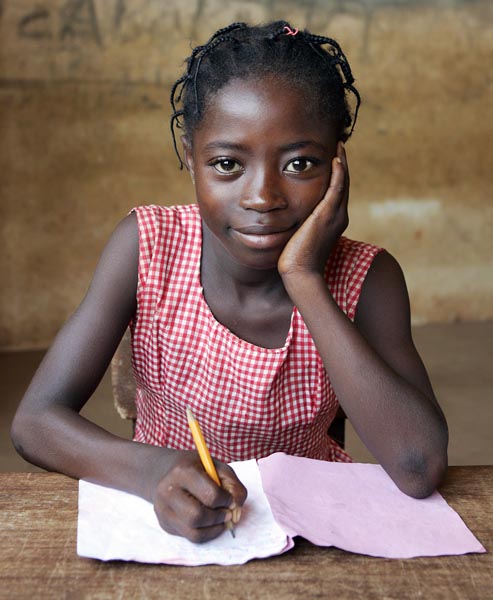
The big talk in Accra, Ghana these days is whether or not soccer star Michael Essien will be healthy enough to play in the 2010 World Cup held this June in South Africa. Sure, Essien’s getting up there in years (he’s 27!), but the Chelsea midfielder’s presence–even when not at his best—is always a threat. At least that’s what some of the students I met at Ryan’s Irish Pub in Accra told me.
Recently, I had the opportunity to work in Ghana as part of my day job at ONE. What struck me most during my two weeks there was everyone’s strong sense of country pride. The people that I met in Ghana had pride in their beloved football stars, pride in their role as hosts to US Presidents Clinton, Bush, and Obama, and particular pride in their recent years of progress. This is not a place of long faces and dire stories – this is a place of forward-looking hope and continued progress. This is a place filled with success stories amidst a global situation with many challenges. Ghana is the self-proclaimed Black Star of Africa.
Here’s a brief snapshot of what I’m talking about:
- The last five elections have been free and fair
- Ghana has seen steady economic growth—4-5% for the last 20 years
- It’s one of the few African countries on track to surpass Millennium Development Goal 1—to of halve poverty by 2015. In fact, in 1992, 52% of the country was living on less than $2 a day.I In 2006 that number dropped to 28.5%.
- Malaria deaths have been cut in half in the last few years and substantial progress has been made in the fight against HIV/AIDS
- 80% of the country now has access to clean water, up from a dismal 50% at the end of the 1990’s.
- Primary school enrollment has shot up to 73%, as a result of debt cancellation and smart policies
It’s important to celebrate these successes. In the long walk to ending extreme poverty, it’s easy to get bogged down in the weight of what still needs to be done.
But it’s also important to look at the whole picture. A few years ago I spent some time in Freetown, Sierra Leone. There was usually 15 minutes of electricity per day, no running water, and there were massive infrastructure challenges everywhere. Accra, Ghana, is a far cry from that. But a 30-minute drive outside the capital city reveals a host of villages that will be faced with great challenges on the road. We must not forget that.
We must also remember that we live in a globalized neighborhood, where Ghanaians literally are our neighbors (or ancestors for many of us – First Lady Michelle Obama traces her roots there). So as our neighbors, how are we going to live well together? How are we going to trade well together? How are we going to care well for one another? These are the perfect questions and conversations to be had by those of us involved in One Days Wages as we take action for and with the world’s poor. It’s a matter of being good neighbors in the 21st century. There’s good news there in the end – let the success stories pave the way for sustained future progress.
And thankfully, we can spend a little of our daily wage on a pint at the pub and talk football, too.
Adam Phillips is Faith Relations Manager for ONE. Adam also serves on the Advisory Board for One Day's Wages.
Photo Credit: Dennis Thern via Flickr // a primary school in Ghana

